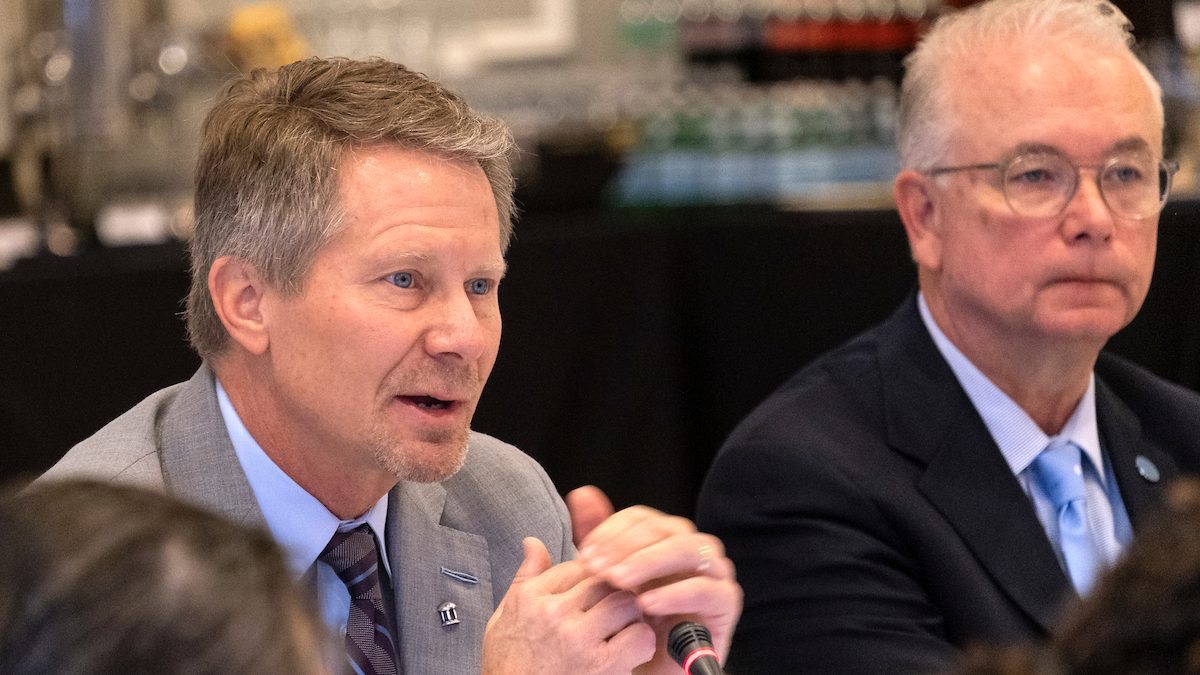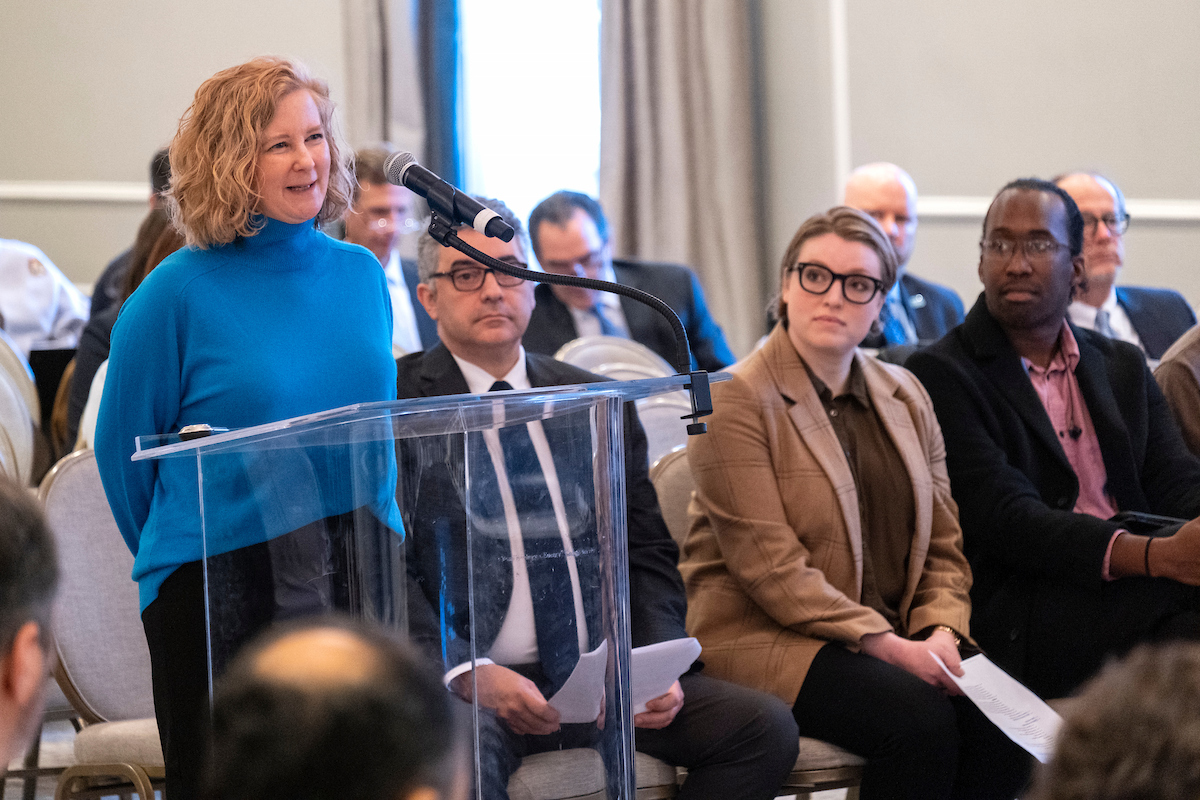Graduate education opportunities move University forward
Chancellor praises graduate stipend increase and shares plans for new working groups in remarks to Board of Trustees.

Chancellor Kevin M. Guskiewicz told University Board of Trustees members at the Jan. 26 meeting that the semester was off to a good start thanks to commitments to provide more opportunities and resources for Carolina’s graduate students.
Those commitments include the single largest increase in University history for minimum graduate student stipends and plans to build research and innovation spaces for graduate students to provide them with the tools and resources they need to succeed.
“By working closely with this board, I am grateful that we were able to show our commitment to these incredible students,” Guskiewicz said. “We must ensure they have the tools and resources they need to succeed as the future academics, leaders and inventors of our world.”
The new minimum stipends for graduate students in research and teaching assistant positions, effective Jan. 1, are now $16,000 for master’s students and $20,000 for doctoral students, both for a nine-month service period. Theodore Nollert, the president of the Graduate and Professional Student Government and a doctoral candidate, helped lead the stipend increase proposal.
“I think it’s proof that we have at Carolina a successful model of collaborative, data-driven advocacy,” Nollert has said of the stipend increase. “I think it sets us up for a lot of success over the next five years to support the mission of the University and for the various governments to support their constituents as they collaborate with central administrative partners.”
The chancellor also announced plans for two working groups. Guskiewicz has charged a working group on career development for students and that plans are underway for a leadership development process to retain and promote faculty and staff. “We don’t want to lose the talent pool that we have here. We have got to find opportunities for upward mobility,” he said.
The second group is a committee on academic freedom and free speech, charged this week. “We want to find ways to address the issues facing our society in a way that ensures every voice on our campus can be respectfully heard,” Guskiewicz said. “We want to shine a light on our research expertise so that we can inform policymakers, legislators and others to make sound decisions to move society forward.”

Elizabeth Engelhardt tells the Board of Trustees about Southern Futures. (Jon Gardiner/UNC-Chapel Hill)
Southern Futures
In the featured presentation of the meeting, Elizabeth Engelhardt, senior associate dean for fine arts and humanities in the College, talked about Southern Futures. This collaborative network based in the Center for the Study of the American South bridges the College, University Libraries and Carolina Performing Arts to reimagine the American South.
A highlight of the presentation was a video about Grammy- and MacArthur Award-winning musician Rhiannon Giddens and “Omar,” the opera Giddens co-wrote with composer Michael Abels, to be performed at Memorial Hall Feb. 25-26. Giddens, Southern Futures at CPA Artist-in-Residence, was inspired by the life of Omar Ibn Said, a West African scholar enslaved and brought to South Carolina in 1831, and researched his story using historical texts found in Carolina’s Louis Round Wilson Library, among other sources.
Southern Futures is a “unique asset poised to reach across this university,” said Engelhardt, who asked the trustees to imagine putting hundreds of Southern Futures scholars, “who have spent time in our libraries, who have learned to listen, create and imagine,” out into the world.
Budgets, campaign and safety
Committee meetings on Jan. 25 featured these key presentations:
- Budget, Finance and Infrastructure: Dean Ramona Denby-Brinson of the School of Social Work shared the school’s approach to budgeting, applauded by the chancellor and trustees as a model of alignment with the University’s Carolina Next strategic priorities.
- External Relations: Jeff Hill, associate vice chancellor of campaign management and marketing in University Development, looked back at the $5 billion Campaign for Carolina.
- Audit, Compliance and Risk Management: George Battle, vice chancellor for institutional integrity and risk management, introduced a presentation by Darrell Jeter, director of emergency management and planning, and UNC Police Chief Brian James on emergency preparedness and active shooter response initiatives.
Civility and civic life resolutions
At the full board meeting, trustees passed the following resolutions:
- Resolution on the Promotion of Collegial Atmosphere: Trustees signed a printed copy of the pledge “to promote a collegial atmosphere on campus and beyond.” The 89-word commitment, which originated in the Strategic Initiatives committee, includes a pledge “to treat all students, faculty, staff, and our entire University community with respect, dignity, courtesy, and generosity of spirit” and to “acknowledge the value of varying backgrounds, experiences, perspectives and opinions among the members of our diverse university community.” “Our board has committed to respectful and open discourse, which was illustrated as the trustees worked through several issues in a public setting,” said board Chair David L. Boliek Jr. “This standard underpins the abiding values of UNC-Chapel Hill.”
- Resolution in Support of School of Civic Life and Leadership: Boliek introduced this resolution to support the development of “degree-oriented programs in the area of Civic Life and Leadership,” which could be housed in an existing school. He said the need for these vital skills has been in discussionfor a while and will build on the great workalready happening on campus, especially in the Program for Public Discourse.It will also accelerate an important part of the IDEAs in Action curriculum.The resolution set a goal of at least 20 dedicated faculty. The faculty hiring goal meshes with a funding request from the College of Arts and Science to hire 20 term faculty members to broaden the College’s program for public discourse and support the new curriculum, said J. Christopher Clemens, provost and chief academic officer. In that curriculum, “there is a call for oral speech and communication, debate and deliberation as a capacity not that one student gets, not that majors in a program get, but that every student gets,” Clemens said.
- Resolution on Protecting Student Constituency Representation at the Board of Trustees Meetings: Student Body President Taliajah Vann introduced this resolution to give a graduate student representative up to three minutes of speaking time at each Board of Trustees meeting. Vann, who is an undergraduate and an ex-officio trustee, currently devotes one-third of her remarks to issues relating to graduate students. But she wanted “an additional safeguard to ensure both constituencies have a voice.”
Watch a recording of the Jan. 26 meeting of the University Board of Trustees.




